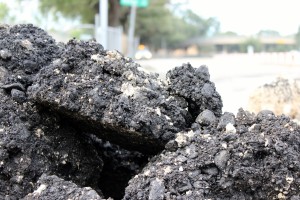Science
Study Reveals Houston’s Vacant Lots Fuel Dangerous Heat

A recent study by researchers at Texas A&M University highlights the role of abandoned buildings and vacant lots in exacerbating surface temperatures in Houston, a city already ranked among the ten hottest in the United States. Utilizing advanced thermal imaging technology mounted on drones, the team, led by lecturer Dingding Ren, mapped surface temperatures across seven different sites within the city.
Over the course of their research, the team collected more than 1,400 drone images and integrated them with NASA satellite data from the LandSat program to evaluate heat risks across various zones, including residential, commercial, and industrial areas. The study revealed that vegetated or vacant land significantly lowers land surface temperature, while abandoned structures contribute to higher temperatures due to heat-retaining materials.
Impact of Urban Heat on Vulnerable Communities
According to the findings, surface temperatures in areas with vegetation can be as much as 20 degrees Fahrenheit cooler compared to those dominated by abandoned buildings and paved lots. This information underscores a critical concern: higher surface temperatures correlate with increased social vulnerability, indicating that neighborhoods experiencing extreme heat are at greater risk during natural disasters.
“The research highlights the need for targeted cooling strategies,” stated Ren. He emphasized the importance of implementing passive cooling mechanisms, such as improved infrastructure and land reuse, to mitigate heat risks and enhance climate resilience in disadvantaged communities.
The study indicates that Houston has approximately 45,000 acres of vacant land and 10,000 acres of abandoned buildings. Ren views these figures as indicative of a significant opportunity for enhancing green infrastructure in the city. He remarked, “The vacant and abandoned land is considered a missed opportunity because there are many passive cooling systems that can help to reduce the local microclimate.”
Potential for Green Infrastructure Improvements
Passive cooling mechanisms are design strategies aimed at either removing heat or preventing it from entering buildings and other specific locations. The implications of this research extend beyond mere temperature assessments; they stress the necessity for thoughtful urban planning that addresses the climate challenges faced by Houston’s residents.
With the summer months becoming progressively hotter and more extreme, the findings of this study serve as a call to action for city planners and policymakers. By prioritizing the revitalization of neglected urban spaces and enhancing green infrastructure, Houston can work towards alleviating the heat burden on its most vulnerable populations.
As cities across the globe grapple with rising temperatures and climate change, Ren’s research offers valuable insights into the importance of sustainable urban development. The potential for creating cooler, more livable environments through targeted strategies cannot be overlooked as communities strive for resilience in the face of environmental challenges.
-

 Lifestyle3 months ago
Lifestyle3 months agoLibraries Challenge Rising E-Book Costs Amid Growing Demand
-

 Sports3 months ago
Sports3 months agoTyreek Hill Responds to Tua Tagovailoa’s Comments on Team Dynamics
-

 Sports3 months ago
Sports3 months agoLiverpool Secures Agreement to Sign Young Striker Will Wright
-

 Lifestyle3 months ago
Lifestyle3 months agoSave Your Split Tomatoes: Expert Tips for Gardeners
-

 Lifestyle3 months ago
Lifestyle3 months agoPrincess Beatrice’s Daughter Athena Joins Siblings at London Parade
-

 World3 months ago
World3 months agoWinter Storms Lash New South Wales with Snow, Flood Risks
-

 Science3 months ago
Science3 months agoTrump Administration Moves to Repeal Key Climate Regulation
-

 Business3 months ago
Business3 months agoSoFi Technologies Shares Slip 2% Following Insider Stock Sale
-

 Science2 months ago
Science2 months agoSan Francisco Hosts Unique Contest to Identify “Performative Males”
-

 Science3 months ago
Science3 months agoNew Tool Reveals Link Between Horse Coat Condition and Parasites
-

 Sports3 months ago
Sports3 months agoElon Musk Sculpture Travels From Utah to Yosemite National Park
-

 Science3 months ago
Science3 months agoNew Study Confirms Humans Transported Stonehenge Bluestones









